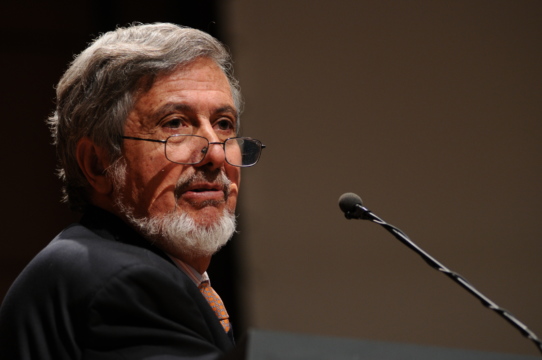
Impact of Lower Commodity Prices on Latin American Growth
With the recent decline in commodity prices, why have some countries have fared better than others?
This post is also available in: Español
On March 18, the Inter-American Dialogue’s Education Program, the Early Childhood Development Action Network (ECDAN), UNICEF’s Regional Office for Latin America and the Caribbean, and Atipay, Innovación para la Gestión held a webinar to reflect on Peru’s recent efforts to develop and implement a government-wide results-based budget for early childhood development. Panelists from Peru shared their experiences with this multi-sectoral budgeting policy and described the key components for coordinating the planning and development of the tools used to achieve the multi-sectoral objectives.
This virtual panel featured Roger Salhuana, manager of Atipay, Innovación para la Gestión; Ariela Luna, former minister of Development and Social Inclusion in Peru; and Luis Miguel Castilla, former minister of Economy and Finance in Peru. The webinar was moderated by Ariel Fiszbein, director of the Inter-American Dialogue’s Education Program, with the participation of Mónica Rubio, regional adviser for social policy in Latin America and the Caribbean for UNICEF, Elizabeth Lule, executive director of ECDAN, and Shekufeh Zonji, global technical lead of ECDAN. The event was attended by 350 participants.
In Latin America, early childhood services coverage has increased due to growth in the support and commitment of governments in the region towards consolidating policies focused on early childhood development. Financing, which enables services to be scaled and ensures efficiency, remains critical. The Regional Agenda for Early Childhood Development has contributed to an increase in exchange, collaboration, and cooperation across the region on this issue. The case of Peru presents an opportunity to continue advancing the regional agenda and to demonstrate how to execute multi-sectoral policies.
Roger Salhuana presented an overview of Peru’s results-based budgeting approach, illustrating how the program was used to reduce chronic malnutrition levels between 2007 and 2008. This decrease in malnutrition was a result of strong public policy management which signified, among other things, proper budget oversight and firm political support for the program. Salhuana suggested that this approach, drawing on evidence from some of the best solutions to early childhood development problems, provides an effective means to coordinate a budget using scarce resources. Another important element of the program is its emphasis on measurement, including evaluation of results and products twice a year. Frequent evaluations help in determining which strategies work best and how to allocate resources based on evidence produced through monitoring.
Salhuana also discussed key moments in the history of the program. For example, the budget was expanded in 2011, allowing for greater coverage and an increase in the number of programs. In 2017, several modifications were made to the program as a result of the change in administration and instability. Those modifications led to the enactment of a new general budget law in 2018 which specified that early childhood development results are a priority. Afterwards the program entered a period during which it defined: 1) what are the specific results related to early childhood development, 2) what concrete objectives must be achieved, 3) what services must be provided, and 4) which authorities must be involved. This resulted in a redesign of the program based on a multi-sectoral approach. Today, early childhood development in Peru benefits from an evidence-based budget program with multi-sectoral and political legitimacy.
Salhuana finished his presentation by noting several challenges, such as the fact that it is more complicated to achieve results in early childhood development than for targeted issues such as chronic malnutrition. Chronic malnutrition is one of many factors that affect early childhood development. In addition, the challenge of achieving results requires commitment and necessary decision-making in an environment of political instability, which causes great uncertainty and difficulty in consolidating efforts across several ministries. Finally, Covid-19 halted the advancement of the program implementation in 2020, and this has caused a large delay.
As the minister of Development and Social Inclusion, Ariela Luna was one of the leaders for the results-based budgeting program for early childhood development. She began her remarks by discussing some of the central components of the program:
Luna went on to describe how the programs function. Overall, there are 11 interventions, and all children receive integrated service packets at specific ages. She noted, however, that out of 30 total products, only two involved multiple ministries, requiring technical guidelines for implementation and coordination across the distinct sectors involved. In practice, the management of these efforts necessitates the use of a series of indicators to help improve the quality of expenditures. Luna elaborated on her role as minister in coordinating these efforts, including confronting a variety of governance challenges at the political, technical, budgetary, and above all, societal level. To end, Luna noted the need to create a model that can be managed at the regional and/or state level, generates a system of alerts, and ensures that every Peruvian child receives their integrated package of services.
During his presentation, Luis Miguel Castilla highlighted that as minister of Economy and Finance his goal was to address public management challenges regarding budgeting. He recognized that, while the same approach might not work in every country in the region, Peru’s experience demonstrates unique elements and a variety of lessons learned. Castilla commented that, in general, government budgets protect specific items, and that they can be very rigid (for example, not being able to fund solutions to a problem that is not stipulated in the budget), which can have unwanted side effects. Beyond this, when trying to resolve these problems, it is necessary to avoid program duplication to ensure efficiency given scarce resources.
He also mentioned the challenges that the program faces moving forward. The first, and most important, is how to support the results-based budget policy efforts within the supply and logistics system in terms of providing goods and services throughout the country. The second challenge was staff members’ lack of technical capacity due to political and economic instability, as well as high levels of staff turnover among those in charge of the programs. These challenges exacerbate management difficulties.
To conclude, Castilla shared three opportunities for the program:
The event concluded with a brief set of questions from the audience about the budgeting policy, focusing on three main issues: 1) fair budget allocation and the importance of ensuring allocation of resources for vulnerable groups, 2) the role of ministries and other actors in the process, and 3) the instruments, investments, and/or mechanisms needed to monitor the quality of delivery.
Ariela Luna highlighted the importance of ensuring resources for all, negotiating rather than imposing goals, and not penalizing the budgets of groups who do not meet their goals. The panelists discussed the roles of different ministries in the program, such as Economy and Finance, Development, and Social Inclusion, as well as the participation of other sectors such as the ministries of mining, housing, health, and education. They also stressed the role of civil society organizations in ensuring that early childhood development remains a political priority. Recently in Peru, civil society has been involved in creating reports, engaging in dialogue, and monitoring programs and services. While no formal channel for civil society participation currently exists, the panelists talked about the need to institutionalize such involvement moving forward. Finally, the panelists discussed the need for real-time data (daily, weekly, monthly, and/or yearly) to inform financial and operational considerations, as well as to share relevant information across all involved agencies.
With the recent decline in commodity prices, why have some countries have fared better than others?
Peru’s growing urban middle class is one of the country’s greatest assets, but it also brings political and governance challenges.
This post is also available in: SpanishSince December 2005, Argentina implemented an Education Financing Law, a tool that modified the structure of financing education and introduced significant changes in political and financial relations between national and subnational governments. Its main objective is to increase investment in education, science, and technology…
 Main Photo: ©UNICEF Perú/2011/ Francis R
Main Photo: ©UNICEF Perú/2011/ Francis R
